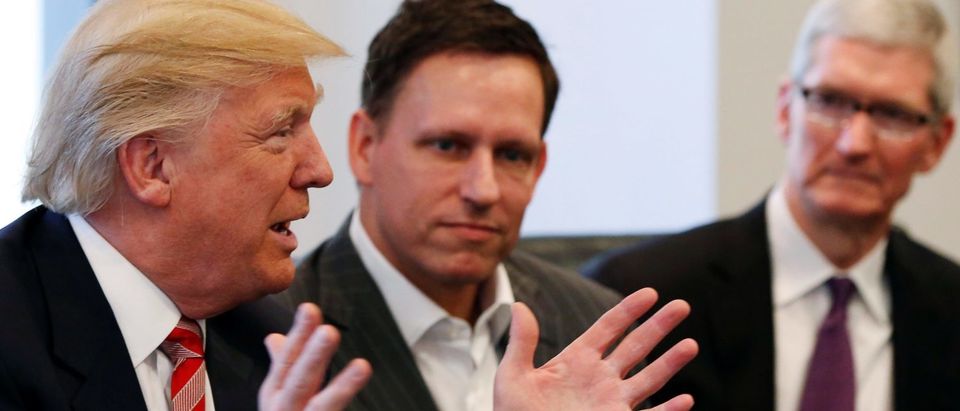Anyway you look at it, it’s become increasingly clear that college is a racket. It stifles the best and brightest, subordinating their potential to the bureaucratic ladders of race and gender hierarchy. And for everyone else, the vast majority, it simply isn’t worth it. So it’s good news that conservative billionaire Peter Thiel’s six-figure offer to skip college is “more popular than ever.”
Thiel made his fortune alongside Elon Musk as a co-founder of PayPal. He also benefited from being an early investor in Facebook. Yet, ideologically, he stands out from the sea of uber-wealthy tech bros in Silicon Valley. With an iconoclastic mix of political beliefs — part libertarian, part nationalist, well-aligned with the American First agenda — he remains a Trump-friendly conservative megadonor and activist. So it’s safe to say he’s not the type to eschew risk in favor of respectable convention and orthodoxy.
Peter Thiel thinks Western Europes future is either
1) Sharia Law
2) AI Orwellian state
3) Hyper woke environmentalism pic.twitter.com/IOTGl8d4Dc— Magoo PhD (@HodlMagoo) February 25, 2024
This helps explain his “Thiel Fellowship,” which since 2010 has given “$100,000 to young people who want to build new things instead of sitting in a classroom.” In the coming weeks, the program will announce 20 new fellows chosen from the largest applicant pool it has received, according to The Wall Street Journal (WSJ).
As part of the two-year fellowship, students opt to leave or skip college and instead focus on innovation, enjoying funding, mentorship and networking opportunities from Thiel as they go. So far, 271 young people have gone through the program, charting new territories in industries from cryptocurrency and AI, to medical research and environmentalism, the WSJ reported. The fellowship’s guiding philosophy is that “young people can succeed by thinking for themselves instead of following a traditional track and competing on old career tracks.”
And this is precisely what the guardians of these “old career tracks” find so threatening. Thiel faced criticism early on for pushing “techno-utopianism,” as well as for harboring hypocritical attitudes toward education, given he holds a law degree from Stanford. Former Harvard President Larry Summers called the fellowship the “single most misdirected bit of philanthropy in this decade.” Yet what the critics really fear is that Thiel is right. If the fellowship works, it discredits them, the philosophy their careers are built on and the system they gate-keep — along with all the sinecures and clout it brings.
NEW RELEASE: ‘Poisoned Ivies’ | WATCH NOWhttps://t.co/ndLbGAdKsu
— Daily Caller (@DailyCaller) February 16, 2024
However, they don’t really need to fear an activist billionaire undermining their credibility and legitimacy. They’ve done that just fine on their own.
Decades ago, college was a place to learn for the sake of learning. Knowledge, discovery and critical thinking were the primary goals of higher education; credentialing and job skills were just an afterthought. When the Supreme Court found IQ tests for hiring were unconstitutional in 1971, colleges increasingly became a proxy. If you went to a top school, it was safe to assume you were among the best and brightest. Yet now, the schools which ostensibly cater to the best and brightest care more about honoring progressive orthodoxies than anything else. Their talent, skills and abilities mean little if someone else performs better in the Oppression Olympics.
Gifted students must waste time and energy navigating a complex web of (often contradictory) social values, diversity training programs and identity hierarchies if they wish to get anything done in their core field. And they must prepare to do it all over again once they enter the workforce. That is, if they can even get in in the first place, given the rampant race-based admission schemes. As the recent, twin scandals of plagiarism and antisemitism on top college campuses have shown, higher education has become a husk of its former self. (RELATED: NEW RELEASE: ‘Poisoned Ivies’ | WATCH NOW)
That Thiel’s fellowship is succeeding shows the culture is shifting. Overachievers of the younger generations have had it drilled into them since birth that gaining an elite degree is the most important indicator of success. As the celebrity-laden college admissions fraud scandal showed, wealthy parents will do just about anything to get their kids into top schools. But as more kids than ever are prepared to walk away from college, it shows that they are no longer buying the credentialing lie of higher education’s gate keepers.
‘Poisoned Ivies’ is OUT NOW! Watch it Here: https://t.co/mS3ba9En7Y pic.twitter.com/vX7VYnSwf1
— Daily Caller (@DailyCaller) February 22, 2024
And they’re right. College no longer has anything to offer a truly gifted student. Someone who has the vision and skill to succeed without it, should.
Yet for everyone else, college is still sold as an integral step in the ladder to a stable, middle class life. Get a degree, get a good job, buy a house, build a family and retire comfortably at 65 — these are the lies we’re still told, and they’re more incredulous each day. A new study from the Burning Glass Institute shows that a majority (52%) of college graduates start off underemployed, in jobs that don’t require their degrees. Worse, many of them are likely to remain there ten years after graduation. Even a decade out from school, a whopping 45% percent of college graduates are still working in jobs that don’t require their degree, the study found. Would these students not have been better off pursuing a trade and avoiding all the debt of college?
America doesn’t need more middle-managers, communications consultants or gender experts who become lifelong baristas. We need more visionaries who are going to drive the country to bold new frontiers, as well as more truckers, electricians, welders and plumbers who will keep the country moving. Colleges have no interest in delivering on either front. So no matter who you are, dropping out of college might wind up being the best thing you ever did.


